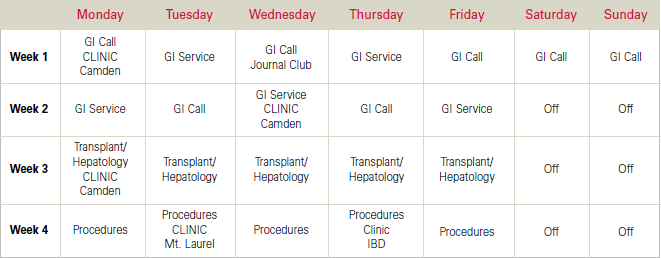Gastroenterology Consultation Service – Cooper University Hospital
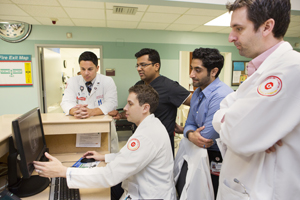 The Cooper University Hospital inpatient GI consultation service focuses on evaluation and treatment of gastrointestinal, liver, pancreatic, and biliary diseases. Two fellows cover this service each week. The rotation is split between call weeks and service weeks. During service weeks, fellows round from Monday to Friday. The typical day starts at 7:00AM and ends at 4:30PM. Fellows on service but NOT on call are responsible for pages during the day and will have the entire weekend off.
The Cooper University Hospital inpatient GI consultation service focuses on evaluation and treatment of gastrointestinal, liver, pancreatic, and biliary diseases. Two fellows cover this service each week. The rotation is split between call weeks and service weeks. During service weeks, fellows round from Monday to Friday. The typical day starts at 7:00AM and ends at 4:30PM. Fellows on service but NOT on call are responsible for pages during the day and will have the entire weekend off.
While on call at Cooper, fellows field outpatient emergencies and inpatient consults or calls via pager system notification beginning at 4:30 PM. The call week begins on Monday and ends the following Monday morning. Call is taken from home and the on-call fellow rounds with the attending during the weekend.
Cooper University Hospital uses the EPIC electronic medical record system (EMR) for both inpatient and outpatient care. All labs, imaging, and notes are integrated through this EMR. All fellows will be trained on EPIC during their orientation.
Transplant Hepatology
Fellows have experience with liver transplantation at Einstein Medical Center and Virtua Our Lady of Lourdes in Camden where they work with their inpatient and outpatient hepatology teams. While working closely with attending hepatologists, the fellows gain experience of broad hepatology disorders as well as following transplant patients longitudinally. They also attend pre- and post-transplant clinic as well as general hepatology clinic.
Endoscopic Procedure Unit
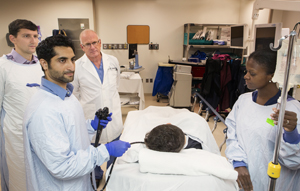 Fellows are exposed to a wide variety of endoscopic techniques and therapeutic interventions during their endoscopy unit rotations. First and second year fellows focus on developing expertise in performing esophagogastroduodenoscopy (EGD), colonoscopy and enteroscopy. Fellows quickly learn tissue sampling, basic and advanced polypectomy, and percutaneous endoscopic gastrostomy (PEG) tube placement. They also develop skill in endoscopic management of esophageal varices, and peptic ulcer bleeding.
Fellows are exposed to a wide variety of endoscopic techniques and therapeutic interventions during their endoscopy unit rotations. First and second year fellows focus on developing expertise in performing esophagogastroduodenoscopy (EGD), colonoscopy and enteroscopy. Fellows quickly learn tissue sampling, basic and advanced polypectomy, and percutaneous endoscopic gastrostomy (PEG) tube placement. They also develop skill in endoscopic management of esophageal varices, and peptic ulcer bleeding.
Third year fellows at Cooper University Hospital are trained in advanced endoscopic procedures. A unique feature to our program is that each fellow has an opportunity to graduate with a certification to perform ERCP in practice. Third year fellows are also exposed to cyst gastrostomy placement, endoluminal and esophageal stents, radiofrequency ablation (RFA) for Barrett’s metaplasia, endoscopic mucosal resection (EMR), endoscopic ultrasound (EUS), and rectal ultrasound (RUS).
Procedures Offered
Upper Endoscopy
- Esophagogastroduodenoscopy (EGD)
- Bravo Capsule placement
- Radiofrequency Ablation (RFA)
- Endoscopic Mucosal Resection (EMR)
- Esophageal and Endoluminal Stent Implantation
- Percutaneous Endoscopic Gastrostomy (PEG) tube
- Double Balloon Enteroscopy
Esophageal Motility
- Esophageal Manometry
- pH Impedance Monitoring
Lower Endoscopy
- Colonoscopy
- Chromoendoscopy
- Narrow Band Imaging (NBI)
- Flexible Sigmoidoscopy
- Anoscopy
Video Capsule Endoscopy
Advanced Therapeutic Procedures
- Endoscopic Retrogradecholangiopancreatography (ERCP)
- Biliary and Pancreatic Manometry
- Cholangioscopy (Spyglass procedure)
- Endoscopic Ultrasound (EUS)
- Rectal ultrasound (RUS)
- Cystgastrostomy placement
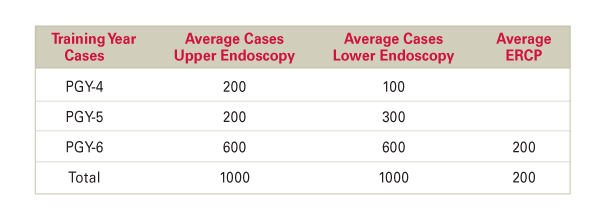
Inflammatory Bowel Diseases
During procedure, research, and video capsule rotations, all fellows rotate in Cooper’s Inflammatory Bowel Diseases Center. Fellows spend Thursday afternoon with Dr. Thomas Judge, Director of the IBD Center, and Dr. Yize Wang managing patients with ulcerative colitis and Crohn’s disease in the outpatient setting. Fellows have the opportunity to initiate complex therapies and visit the infusion center for various treatment modalities.
Video Capsule Endoscopy
Fellows are trained in VCE to visualize and diagnose the most difficult small bowel pathology. Cooper offers state of the art, high resolution video capsule imaging. Fellows read video capsules with faculty who have expertise in this technology.
Research Rotation
Clinical research stimulates the academic mind, and we believe at Cooper that part of becoming a specialist in gastroenterology is participating in scholarly activities. Each fellow is encouraged to participate in at least one translational and/or clinical research project during the three year training period. Funding is provided for the fellow to present at local, regional and national meetings.
Ambulatory Experience
General Fellows Clinic
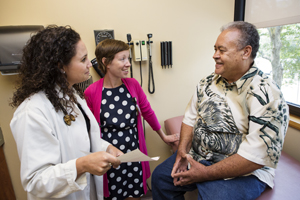 There is a diversity of ambulatory gastroenterology and hepatology experiences at The Cooper Digestive Health Institute. Fellows have a weekly continuity clinic during the three year training program. The fellow can expect to see 6-12 patients in each ½ day clinic session. Notes, labs, and orders are placed through the EPIC EMR, which is fully integrated with our institution’s primary health record system. /p>
There is a diversity of ambulatory gastroenterology and hepatology experiences at The Cooper Digestive Health Institute. Fellows have a weekly continuity clinic during the three year training program. The fellow can expect to see 6-12 patients in each ½ day clinic session. Notes, labs, and orders are placed through the EPIC EMR, which is fully integrated with our institution’s primary health record system. /p>
Monday clinic is located at 3 Cooper Plaza, Camden, NJ and is supervised by Dr. Thomas Judge. This clinic site allows exposure to a diversity of patients, who reside primarily in Camden, NJ, and focuses on an underserved population. On Tuesday, clinic occurs at 501 Fellowship Road, Mount Laurel, NJ and is supervised by Dr. Cynthia Greich-McCleery. This clinic offers exposure to a suburban New Jersey population. Clinic on Wednesday is supervised by Dr. Joshua DeSipio and located at the Cooper campus in Camden.
IBD Clinic
While on the research rotation, fellows attend Inflammatory Bowel Disease (IBD) clinic on Thursday afternoon. Fellows are trained in outpatient management of IBD. This ambulatory experience is held at the Mount Laurel clinic, supervised by Drs. Judge and Wang who have clinical expertise in managing patients with Crohn’s disease and ulcerative colitis.
Hepatology, Transplant Evaluation, and Post-Transplant Clinics
The outpatient hepatology experience is enhanced while rotating on the primary liver transplantation service. Fellows attend different clinics throughout the week that focus on patients awaiting liver transplant, managing patients who have undergone transplantation, as well as managing all disorders in the field of hepatology.
Sample Weekly Schedule
